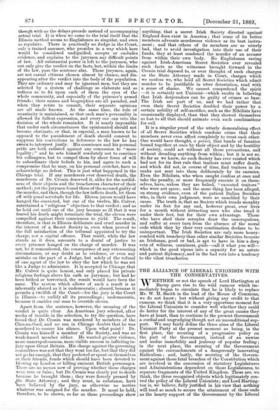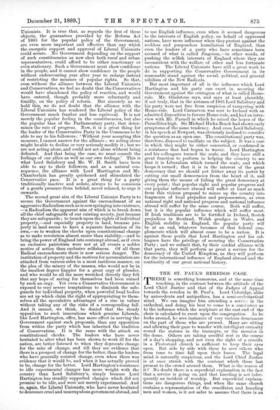THE ALLIANCE OF LIBERAL ITNIONISTS WITH - THE CONSERVATIVES.
WHETHER or not the speech of Lord Hartington at Bacup gave rise to the wild rumour which im- mediately began to circulate that he is likely to replace Mr. W. H. Smith in the lead of the House of Commons,' we do not know ; but without giving any credit to that rumour, we think that it is a very opportune moment for the Liberal Unionists to consider well whether they could do better for the interest of any of the great causes they have at heart, than to continue to the present Government a cordial and ungrudging though not an unconditional sup-' port. We may fairly define the three aims of the Liberal Unionist Party at the present moment as being, in the first place, the securing of a progressive policy on the part of the Government, instead of an unwise and undue immobility and jealousy of popular feeling ; in the next place, the securing of the Government against the encroachments of a dangerously innovating Radicalism ; and, lastly, the securing of the Govern- ment against those fatal breaches of the Constitution which are involved in the concession of statutory Legislatures and Administrations dependent on those Legislatures, to separate fragments of the United Kingdom. These are, we think, the three recognised objects which legitimately con- trol the policy of the Liberal Unionists ; and Lord Harting- ton is, we believe, fully justified in his view that nothing will tend so much to secure the attainment of these ends as the hearty support of the Government by the Liberal Unionists. It is true that, as regards the first of these objects, the guarantees provided by the Reform Act of 1885 for the popular policy of the Government, are even more important and effective than any which the energetic support and approval of Liberal Unionists could secure. No Government depending on the support of such constituencies as now elect both rural and urban representatives, could afford to be either reactionary or even stationary. Such a Government must show confidence in the people, and it cannot show confidence in the people without endeavouring year after year to enlarge instead of restricting the measure of popular rights. So that, even without the alliance between the Liberal Unionists and Conservatives, we feel no doubt that the Conservatives would have abandoned the policy of reaction, and would have entered, though probably more reluctantly and timidly, on the policy of reform. But sincerely as we hold this, we do not doubt that the alliance with the Liberal Unionists has rendered the Liberal policy of the Government much franker and less equivocal. It is not merely the popular feeling in the constituencies, but also the popular bias of the Parliamentary party, that deter- mines the rate of progress. Now, it is a great thing for the leader of the Conservative Party in the Commons to be able to say to his followers : Without your accepting this measure, I cannot answer for the alliance ; we acting alone might be able to decline or very seriously modify it ; but we are not acting alone, and could not act alone without being defeated. And that being the case, we must consult the feelings of our allies as well as our own feelings.' This is what Lord Salisbury and Mr. W. H. Smith have been able to say to their followers, and as a natural con- sequence, the alliance with Lord Hartington and Mr. Chamberlain has greatly quickened and stimulated the Conservative pace. It is a great thing for a party traditionally inactive and sedate, always to be conscious of a gentle pressure from behind; never relaxed, to urge it onwards.
The second great aim of the Liberal Unionist Party is to secure the Government against the encroachment of an aggressive Radicalism such as is now springing into existence, —a Radicalism the apparent aim of which is to break down all the chief safeguards of our existing society, just because they are safeguards ; to trench upon the rights of individual property,—and especially property in land, because pro- perty in land seems to have a separate fascination of its own,—so to weaken the checks upon constitutional change as to make revolution almost easier than stability,—and to bring the power of England into contempt abroad, as if even an exclusive patriotism were not at all events a nobler motive of action than exclusive selfishness. Of all these Radical encroachments there is now serious danger. The institution of property and the motives for accumulation are attacked from various sides in a most insidious manner, on the plea of the misery of the masses, who would not be in the smallest degree happier for a great orgy of plunder, and who would be all the more wretched directly they felt that any hope of saving for themselves had been ruined by such an orgy. Yet even a Conservative Government is exposed to very severe temptations to diminish the safe- guards for individual property, when powerful local bodies are set up which claim the right of appropriating to them- selves all the speculative advantages of a rise in values without taking any of the risks of a corresponding fall. And it cannot, we think, be denied that the steady opposition to such innovations which genuine Liberals, like Lord Hartington, offer, has more effect in nerving the Government against such proposals, than any opposition from within the party which has inherited the tradition of Conservatism. It is the same with the attack on constitutional checks. The leaders who have never hesitated to alter what has been shown to work ill for the nation, are better listened to when they deprecate change for the sake of change, and till they see evidence that there is a prospect of change for the better, than the leaders who have generally resisted change, even when there was evidence that it would be, and when it has actually proved to be, change for the better. Lord Hartington's resistance to idle experimental changes has more weight with the country than Lord Salisbury's, simply because Lord Hartington has steadily supported changes which did not promise to be idle, and were not merely experimental. And so, again, the Liberal Unionists, who have never hesitated to denounce cruel and unscrupulous government abroad, and to use English influence, even when it seemed dangerous to the interests of English policy, on behalf of oppressed nations, have more influence when they protest against the reckless and purposeless humiliation of England, than even the leaders of a party who have sometimes been accused of what is called Jingoism,—in other words, of pushing the selfish interests of England where they are inconsistent with the welfare of other and less fortunate nations. The Liberal Unionists have still a great work to do in supporting the Conservative Government in its reasonable stand against the social, political, and general nihilism of the New Radicals.
But most important of all is the influence which Lord Hartington and his party can exert in securing the Government against the contagion of what is called Home- rule. Mr. Gladstone says, and says at least plausibly, if not truly, that in the autumn of 1885 Lord Salisbury and his party were not free from suspicion of tampering with Home-rule. Lord Carnarvon was sent to Ireland with an admitted disposition to favour Home-rule, anct had an inter- view with Mr. Parnell in which he raised the hopes' of the Parnellites high. Sir Michael Hicks-Beach had shown early symptoms of the same tendency. And even Lord Salisbury, in his speech at Newport, was obviously inclined to consider the question as an open one. The constitutional party was, therefore, disposed to vacillate on the subject. It was a case in which they might be either converted, or confirmed in a resistance that had begun to waver. Lord Hartington and his colleagues turned the scale, and they have still a great function to perform in helping the country to see that it is Liberalism which turned the scale, and which keeps it turned ; that it is in the interest of the great democracy that we should not fritter away its power by cutting out small democracies from the heart of it, and giving them the means of foiling the great democracy at every point ; that popular right and popular progress and our popular influence abroad will suffer at least as much from this vicious proposal to mince up the country into fragments of local prejudice and prepossession, as even national right and national progress and national influence abroad will suffer by the same course. Both will suffer, but it is the popular influence which will suffer most. If Irish traditions are to be fortified in Ireland, Scotch prejudices in Scotland, Welsh grudges in Wales, and English stolidity in England, the popular party will be at an end, whatever becomes of that federal con- glomerate which will almost cease to be a nation. It is against these perils that Lord Hartington and his col- leagues have the privilege of securing the Conservative Party ; and we submit that, by their cordial alliance with that party, they will perform as great a service for the democracy of the United Kingdom, as they will perform for the international influence of England abroad and the continuity of our great national history.











































 Previous page
Previous page